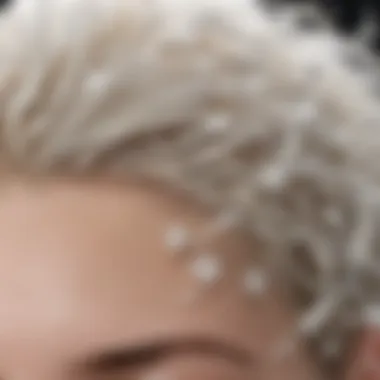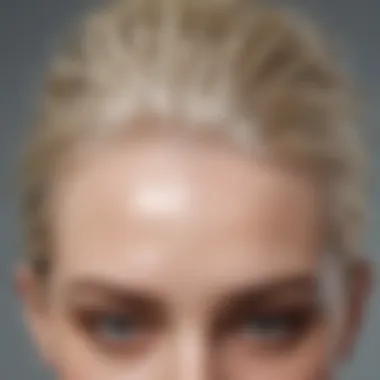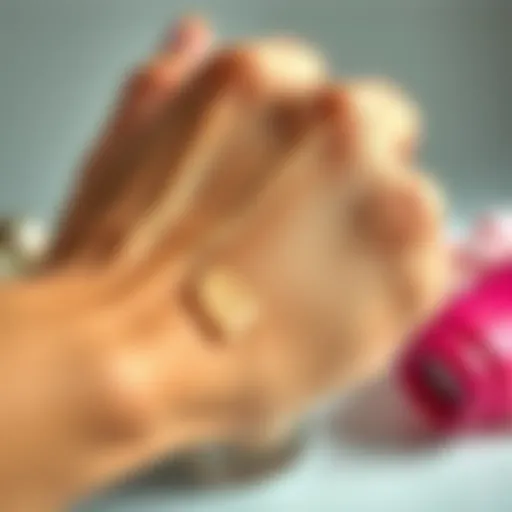Understanding White Dry Scalp: Causes and Solutions


Intro
A healthy scalp tends to be one of those oft-overlooked pillars of beauty, a foundation on which flows radiant hair. Yet, the issue of white dry scalp has become increasingly prominent for many women, whether they are teenagers navigating the world of beauty products for the first time or seasoned style mavens.
Understanding the intricate dynamics of a flaky, parched scalp requires us to look beyond mere appearance and delve into underlying factors that could be at play. This deep dive aims to illuminate the causes, symptoms, and viable solutions associated with white dry scalp. In doing so, it draws necessary connections between scalp health and overall aesthetic vibrancy—one can't shine bright if the canvas beneath is suffering.
Through this exploration, we’ll navigate through a myriad of factors that contribute to dry scalps, from lifestyle influences to environmental impacts. Moreover, we'll also touch on practical tips and tricks for maintaining scalp wellness and how these practices can lead to not only beauty but also self-esteem and confidence.
"To achieve beauty from the outside, one must also care for what lies beneath. A happy scalp means happy hair."
Quite simply, understanding the essence of scalp care is becoming indispensable in today’s world where fashion and beauty norms are constantly in flux. We’ll segment our discussion into clear themes—examining key trends, actionable beauty tips, and sustainable practices—so that you can confidently navigate your beauty journey equipped with potent knowledge.
Preamble to White Dry Scalp
White dry scalp is often an under-discussed issue, yet it can have a considerable impact on one's hair health and overall aesthetic appeal. For many, this uncomfortable condition is not just a minor nuisance; it can lead to embarrassment and social withdrawal. By exploring this topic, we aim to shed light on the significant effects that a flaky scalp may have on women across all ages, while providing informative insights on how to manage and potentially remedy the situation.
When we think about beauty, we often envision silky hair cascades, polished looks, and a perfectly put-together appearance. However, the scalp is equally important as it serves as the foundation for healthy hair growth. A well-cared-for scalp translates into thriving hair. Understanding white dry scalp begins with recognizing its multiple facets – the causes, the symptoms and possible solutions that can be put in place.
Importance of Addressing White Dry Scalp
- Awareness: Increased awareness can empower individuals to seek help and adopt better scalp care routines.
- Connection to Overall Health: Acknowledging that scalp health can reflect general health boosts motivation to maintain well-being.
- Enhanced Self-Confidence: Addressing scalp issues can improve self-perception and confidence levels.
"One's confidence can be significantly tied to their hair; thus, maintaining a healthy scalp is vital for emotional well-being."
As we dive deeper into white dry scalp, it’s essential to unravel its underlying causes and recognize how to distinguish it from other scalp conditions. This initial understanding lays the groundwork for exploring specific solutions and preventative measures. It is not just about masking symptoms; being informed allows for proactive decisions regarding hair and scalp care. With this knowledge, women can take charge of their health and beauty routines.
The benefits are not just aesthetic; they extend to enhancing the overall quality of life. With this foundation laid, we can move forward towards identifying the various symptoms that characterize white dry scalp and how it compares to other, potentially more serious conditions.
Identifying White Dry Scalp
Identifying white dry scalp serves as a crucial first step in addressing the problem effectively. For many, the appearance of a dry, flaky scalp can feel unsettling. Not only can it impact how one feels about their hair, but it can also cause discomfort or irritation. Recognizing the symptoms and understanding their significance can pave the way for timely and appropriate solutions. Neglecting this vital stage may lead to choices that could exacerbate the issue, rather than alleviate it.
Thus, acknowledging the telltale signs of a dry scalp and differentiating it from more severe conditions can empower individuals to take control of their scalp health. Knowledge in this area contributes significantly to maintaining optimal hair health. It also encourages individuals to scrutinize their hair care practices and product choices.
Common Symptoms
Common symptoms of a white dry scalp often include:
- Flakiness: Small white or gray flakes might appear on the scalp and occasionally on the shoulders, especially after wearing dark clothing.
- Itchiness: An incessant itch may accompany the dryness, causing discomfort. This can lead to excessive scratching, resulting in inflammation.
- Redness and Irritation: In some cases, the scalp may appear reddened or feel sensitive to touch.
- Tightness: Many individuals report a feeling of tightness or dryness, especially after washing their hair.
Identifying these symptoms can help clarify whether the issue pertains specifically to dryness, or if there are underlying concerns that require a different approach. For instance, not all flaky scalps are identical; some might benefit from simple hydration, while others might necessitate medical intervention.
Differentiating from Other Conditions
Differentiating white dry scalp from other scalp conditions can be a tricky endeavor. Many individuals often confuse dry scalp with other issues, such as:
- Dandruff: Unlike dry scalp, dandruff usually presents as greasier flakes and can be caused by a fungal infection.
- Psoriasis: This condition can cause thicker, red patches covered with white scales, requiring specific treatment.
- Seborrheic Dermatitis: While symptoms might overlap with dryness and flakiness, this condition is chronic and can affect larger areas, often producing greasy flakes.
Understanding these distinctions is key in determining the right treatment and care. If symptoms persist despite making lifestyle adjustments or using over-the-counter products, consulting a healthcare professional becomes advisable.
Identifying white dry scalp isn't merely an academic exercise; it is the linchpin for implementing effective treatments and achieving a healthier scalp.
Root Causes of White Dry Scalp
Understanding the root causes of white dry scalp is crucial in effectively addressing and preventing the issue. By identifying what triggers this condition, readers can take proactive measures to restore scalp health. Below, we delve into several specific categories that contribute to white dry scalp, enhancing our understanding of this common but often overlooked problem.
Environmental Factors


Environmental elements play a big role in how the scalp reacts. Factors like weather changes can greatly affect your scalp’s moisture levels. For instance, during the winter months, cold air, combined with indoor heating, can lead to a dry scalp. Similarly, overexposure to sun can strip moisture away, leading to irritation and flakiness.
- Pollution also can’t be ignored. Dust and particulates in the air might settle on your scalp, causing a buildup that exacerbates dryness. Washing your hair more frequently might help counter this.
- Living in areas with hard water can introduce minerals like calcium and magnesium into your hair care routine, which may lead to dryness and irritation.
Thus, individuals should consider how their surroundings may be contributing to their scalp issues.
Medical Conditions
Various medical conditions can lead to the development of a white dry scalp. Conditions such as seborrheic dermatitis manifest as red, greasy patches covered with flaky white or yellow scales. Psoriasis, a chronic skin condition, can also cause dry, scaly patches on the scalp. Eczema is another condition that not only affects your skin but can also make your scalp dry and irritated.
People dealing with underlying health issues, like thyroid disorders or autoimmune diseases, may find that these can impact their scalp health as well. Consulting a healthcare professional in such scenarios is essential to manage these conditions effectively.
Dietary Influences
Lastly, it’s wise to consider dietary influences when combating white dry scalp. A poor diet lacking in essential fatty acids can lead to scalp dryness. Foods high in omega-3 fatty acids such as salmon, walnuts, and flaxseeds are critical for scalp health.
- Dehydration can also play a role; drinking enough water is often overlooked yet plays a vital part in maintaining moisture levels in your skin and scalp.
- Furthermore, a lack of vitamins, particularly A, D, and E, can also contribute to dryness. Incorporating a variety of fruits and vegetables in daily meals can promote overall scalp health.
Impact of Hair Products
The effects of hair products on scalp health cannot be overstated. With an ever-expanding variety of shampoos, conditioners, and styling agents, the choices available to consumers can be as overwhelming as sifting through a teenager’s playlist. Yet, the wrong product usage can lead to a cascade of issues, particularly for individuals struggling with a white dry scalp.
Ingredients to Avoid
When navigating the world of hair care, knowledge is power. Some ingredients, while common, can exacerbate dryness and irritation. Here’s a rundown of substances to steer clear of:
- Sulfates: These are harsh detergents that create a rich lather but often strip the scalp of its natural oils, leading to increased dryness. Common culprits include sodium lauryl sulfate and sodium laureth sulfate.
- Alcohols: Not all alcohols are bad, but short-chain alcohols like ethanol, isopropyl, and propanol can dry out the scalp more than a summer sun beating down on an unprotected beach. Opt for fatty alcohols like cetyl or stearyl instead.
- Fragrance and Dyes: These additives can trigger allergic reactions and contribute to irritation, making sensitive scalps redder than a ripe tomato.
- Parabens: Often used as preservatives, parabens may cause skin irritation and are best avoided by individuals with vulnerable skin.
By dodging these ingredients, users can lessen the likelihood of worsening their white dry scalp issues. As they say, it’s better to play it safe than to end up regretting a bad hair day.
Recommended Products
Finding suitable products for managing a white dry scalp can feel like searching for a needle in a haystack, yet several options stand out. Here’s a collection of recommendations that won’t leave you high and dry:
- Gentle, Sulfate-Free Shampoos: Brands like Aveeno and Free & Clear offer formulations that cleanse without the harsh effects of sulfates. These are designed to maintain moisture levels, keeping the scalp in better shape.
- Moisturizing Conditioners: Look for conditioners infused with natural oils like argan or jojoba. Shea Moisture is known for its hydrating ingredients, making it a popular choice among those seeking relief from dryness.
- Scalp Treatments: Products such as The Ordinary’s Multi-Peptide Serum target scalp issues directly and can provide essential hydration and support.
- Natural Oils: A simple yet effective way to care for your scalp is through natural oils. Tea tree oil, diluted with a carrier oil like coconut or olive oil, can mitigate dryness while adding anti-bacterial properties.
In the ever-evolving landscape of hair care, it’s crucial for individuals to adopt a thoughtful approach in selecting products. Choosing wisely can significantly impact not just the hair's appearance but the overall health of the scalp, creating a more harmonious environment for hair growth.
"Our hair is our crown, but the scalp is its throne. Keep it healthy, and it will support your beauty journey."
Treatments for White Dry Scalp
Addressing white dry scalp is not just about aesthetics; it’s about overall wellness for both the scalp and hair. This section delves into various solutions ranging from over-the-counter products to natural remedies, and even professional treatments. It's crucial to tackle this issue effectively as it can impact one’s self-esteem and social interactions. Finding appropriate treatments can lead to a significant improvement in scalp health and, in turn, hair quality. Let's explore the different avenues to combat white dry scalp.
Over-the-Counter Solutions
Over-the-counter solutions serve as a go-to for many seeking immediate relief from dry scalp symptoms. Various shampoos and topical treatments are formulated with ingredients designed to hydrate and balance the scalp. These products often include:
- Salicylic Acid: This helps to exfoliate the scalp, removing flakes while preventing buildup.
- Zinc Pyrithione: Known for its antifungal properties, it's effective in treating dandruff, which may contribute to dryness.
- Coconut Oil: This versatile ingredient offers both hydration and nourishment to the scalp, making it an excellent choice in many formulations.
These products can easily be found at your local drugstore, allowing you to take action quickly against dry scalp discomfort. However, it’s important to choose wisely; pay attention to your scalp’s specific needs and test different products if necessary.
Natural Remedies
For those who lean towards a more holistic approach, natural remedies can provide effective solutions without the potential side effects common in chemical products. Here are a few tried and true options:
- Tea Tree Oil: Renowned for its antiseptic properties, a few drops mixed with a carrier oil like jojoba oil can soothe the scalp.
- Aloe Vera: This plant has moisturizing properties that can reduce irritation and hydrate the skin; simply apply the gel directly on your scalp.
- Apple Cider Vinegar: Diluting this with water can create a rinse that helps restore the scalp’s natural pH balance, reducing dryness.
"Using natural remedies not only nurtures your scalp but also aligns with a more sustainable lifestyle."


Although these remedies may take time to show effects, they can be particularly beneficial for those sensitive to synthetic chemicals.
Professional Treatments
When over-the-counter solutions or natural remedies don’t provide the desired relief, seeking professional help is a viable option. Dermatologists or trichologists can offer tailored treatments based on an individual's specific condition. Some professional interventions include:
- Corticosteroid Injections: These can reduce inflammation and provide rapid relief in more severe cases.
- Medical-Grade Shampoos: Professionals can prescribe shampoos containing higher concentrations of effective ingredients like ketoconazole, which directly target dry scalp conditions.
- Scalp Treatments: Specialized spa treatments focus on improving scalp health through deep cleaning and hydration, often incorporating various oils and nutrients.
If persistent issues arise, getting expert insight may uncover underlying conditions that require different management solutions. It’s essential to address any fears or misconceptions surrounding treatments—professional help is often worth the investment, offering a clearer path to recovery.
In summary, effectively addressing white dry scalp encompasses a mix of over-the-counter products, natural remedies, and professional treatments. Each offers its unique benefits and can be utilized based on individual needs and circumstances. Taking proactive steps is sure to promote healthier scalp conditions and, as a result, more lustrous hair.
Preventative Measures
Preventative measures serve as the foundation for maintaining a healthy scalp. A proactive approach not only reduces the risk of developing white dry scalp but also promotes overall scalp wellness. Understanding and implementing the right strategies can make a world of difference in preventing symptoms before they start. This is especially important for women who prioritize beauty and confidence in their daily lives. Digging into the nitty-gritty details of hair care and lifestyle choices can illuminate ways to foster a flourishing scalp environment.
Daily Hair Care Routine
A consistent and thoughtful daily hair care routine is crucial for preventing dry scalp issues. Here are some key elements to incorporate into your regimen:
- Gentle Cleansing: Use a mild shampoo that doesn't strip natural oils. Look for sulfate-free options, as they are less harsh and help maintain moisture in the scalp.
- Conditioning: Adequate conditioning is not just for the hair; it’s essential for the scalp too. A moisturizing conditioner can provide a barrier, keeping the scalp hydrated.
- Avoiding Over-washing: Frequent washing can lead to dryness. Try to limit washes to two to three times a week to allow natural oils to nourish the scalp.
- Scalp Massage: Incorporating a gentle massage while washing can increase blood circulation. This can aid in delivering nutrients that keep the scalp healthy.
Consider using tools such as a scalp brush to enhance the effectiveness of the cleaning and conditioning process. These simple steps contribute significantly towards maintaining that delicate balance.
Lifestyle Adjustments
Making adjustments to one’s lifestyle can have profound effects on scalp health. Here’s how to create a more scalp-friendly environment:
- Balanced Diet: Consuming a diet rich in vitamins and antioxidants is vital. Foods high in omega-3 fatty acids—like salmon and walnuts—can nourish the scalp from the inside out.
- Hydration: Staying well-hydrated is often overlooked. Drinking enough water influences overall skin health, including the scalp. Aim for at least eight glasses a day.
- Stress Management: Stress can trigger scalp issues. Practices like yoga or meditation can help manage stress levels, ultimately benefiting your scalp’s condition.
- Protective Styles: Opting for protective hair styles can shield your scalp from environmental factors. Tight hairstyles can harm the scalp, instead consider loose protective styles to minimize tension.
- Humidity Control: Scalp health can also be affected by humidity levels. During dry months, use a humidifier at home to keep the air moist.
These measures act like a safety net, ensuring that your scalp maintains its natural equilibrium while also nurturing your hair.
By intertwining these daily hair care habits with intentional lifestyle adjustments, women can significantly mitigate risks associated with white dry scalp, layering benefits that extend beyond just aesthetics. Remember, a little prevention today can spare a whole heap of hassle tomorrow.
Understanding Scalp Health's Role in Beauty
In the realm of beauty, uncategorized elements can play a significant role, and the scalp often gets overlooked. However, a healthy scalp is a foundation of lustrous hair and radiant beauty. It acts as the nurturing soil for our hair, establishing how well it thrives. If the scalp is compromised, the hair may not stand a chance to shine at its fullest potential. Scalp health is therefore intrinsically linked with the quality and appearance of one’s hair, making it a vital topic to understand.
Connection Between Scalp and Hair Quality
The direct relationship between a healthy scalp and high-quality hair is hard to dispute. When the scalp is well-nurtured, it can produce stronger, shinier, and more vibrant hair. Conversely, a dry or unhealthy scalp can lead to problems like hair fallout, dullness, and even slow growth.
Here are some key aspects to consider:
- Nutrient Absorption: The scalp requires essential nutrients to foster hair growth. If the scalp is dry, it might not absorb these nutrients effectively, leading to weak hair.
- pH Balance: A proper pH balance maintains the scalp’s natural oils. An imbalance can make hair fragile and susceptible to damage.
- Microbiome Health: A healthy scalp hosts a diverse ecosystem of microorganisms that contribute to overall scalp health. Disruption in this microbiome can result in various hair issues, emphasizing that a flourishing scalp leads to a flourishing mane.
Ultimately, keeping the scalp in good condition prevents a myriad of hair issues, promoting a crown of hair that many aspire to have.
Psychological Effects of Scalp Issues
Scalp-related concerns can go beyond mere physical impact; they can also take a psychological toll. When one faces issues like flakiness or excessive dryness, it might lead to feelings of self-consciousness or embarrassment. The mind-body connection is real, and thus it's essential to recognize the psychological implications.
Consider the following effects:
- Self-Esteem: Trouble with scalp health can diminish confidence levels. Worrying about visible flakes or dry patches can distract from daily activities.
- Social Interactions: Individuals may shy away from social situations, fearing judgment from others, or feeling out of their skin due to scalp issues.
- Stress and Anxiety: Often, scalp problems can become a vicious cycle. The stress of having a problematic scalp can exacerbate the condition, creating a feedback loop that can be tough to break.
Understanding the psychological ramifications emphasizes the need for addressing scalp health not just from a physical standpoint but also as an essential component of overall well-being and self-perception.
"A healthy scalp is more than skin deep; it’s intertwined with how we see ourselves and how we express our beauty to the world."


By prioritizing scalp health, individuals can uplift both their hair and their mental state, taking back control over their beauty narrative.
Myths and Misconceptions
Understanding the nuances of white dry scalp is essential, not just for addressing personal concerns but for breaking down widespread myths that often cloud our judgment. Misconceptions can lead people down the wrong path, sometimes making matters worse rather than better. Recognizing these myths is key to making informed decisions about scalp health. By delving into common misunderstandings, we can empower readers with accurate information that promotes better self-care practices.
Dispelling Common Myths
One of the most prevalent myths surrounding dry scalp is the notion that it’s solely caused by lack of hydration. While dehydration plays a role, it’s not the only culprit. Factors such as environmental conditions, underlying health issues, and even the use of certain products can exacerbate this condition. Here are a few notable myths:
- Myth 1: Dry scalp is only a winter issue. While cold, dry air can worsen the condition, dry scalp can affect individuals year-round due to various factors like indoor heating or even sun exposure.
- Myth 2: All shampoos are suitable for everyone. In reality, hair and scalp require tailored care. A shampoo that works wonders for one person might irritate another’s scalp, prompting itchiness or flakes.
- Myth 3: Alcohol-containing hair products are harmless. Many people think they are fine as long as they don’t drink alcohol. However, alcohol can be very drying on the scalp and hair, leading to more issues down the line.
Fact vs. Fiction in Scalp Care
When navigating the vast world of scalp care, it’s crucial to differentiate between facts and fiction. Misleading information can place emphasis on the wrong solutions. Here are some distinctions that can help clarify:
"Educating ourselves on scalp health is just as vital as caring for our skin or hair; beliefs based on misconceptions can lead to harmful treatments."
- Fact 1: Scalp health affects overall hair quality. A dry, unhealthy scalp can lead to hair issues, including breakage and thinning. The health of the scalp fundamentally contributes to the health of the hair.
- Fiction 1: Natural products won't irritate my scalp. Even 100% natural products may contain ingredients that can trigger reactions. Always conduct patch tests first.
- Fact 2: Stress can exacerbate scalp problems. Psychological stress has been shown to manifest physically; a troubled mind can lead to chronic scalp issues.
- Fiction 2: You can wash away dandruff with any shampoo. Not all shampoos are created equal. Specific dandruff shampoos, often containing zinc pyrithione or ketoconazole, are designed to confront scalp issues directly.
In summary, the myths surrounding white dry scalp can cloud one's approach to effective treatment. By debunking misconceptions and distinguishing fact from fiction, individuals can gain a clearer understanding of their scalp health, paving the path for informed action and healthier hair.
Cultural Perspectives on Scalp Health
The way people approach scalp health often reflects a rich tapestry of cultural traditions and beliefs. Scalp issues, including white dry scalp, are not just personal struggles; they are interwoven with historical narratives and societal norms. From traditional remedies passed down through generations to modern functionalities that align with contemporary beauty standards, understanding this cultural viewpoint broadens our perspective on scalp care.
Historical Views and Practices
Throughout history, various cultures have attributed different meanings to scalp health. For instance, in ancient Ayurveda, a holistic approach from India, the scalp is viewed as an extension of internal health. Treatments often revolve around balancing three energies known as doshas – Vata, Pitta, and Kapha. Turmeric and coconut oil are popular for promoting scalp wellness, emphasizing the belief that what happens inside our body reflects on our scalp and hair.
In contrast, some African cultures have long honored the scalp as a canvas for artistic expression. Braiding and styling serve not only aesthetic purposes but also function as tools for community bonding and storytelling. Each braid or twist might tell a tale of identity, heritage, or even social status.
"In many African societies, hairstyles have been a reflection of a person’s cultural background, age, and even marital status, further highlighting the cultural significance of scalp health."
Modern Approaches Across Cultures
Today, with globalization, there’s a fascinating blending of techniques and beliefs surrounding scalp care. For instance, the K-beauty trend from South Korea has introduced innovative solutions like scalp treatments and essence products, making scalp health a priority in hair care routines. The focus is firmly placed on products that hydrate, exfoliate, and promote a balanced scalp microbiome. These modern products often incorporate clean ingredients, aligning with a broader shift toward holistic beauty.
In Western cultures, the narrative is shifting as well. Many are moving away from solely aesthetic concerns to a more comprehensive understanding of skin conditions like white dry scalp. Dermatologists increasingly advocate for scalp health as an essential part of overall well-being. This has led to a surge in educational campaigns aimed at debunking myths and promoting healthy practices.
Further, with the rise of social media platforms such as Facebook and Reddit, women of various ages are sharing their own scalp health journeys. This communal exchange of information allows for cultural practices to spread globally, providing diverse perspectives and solutions previously unknown in specific regions.
By exploring the historical and modern cultural approaches to scalp health, we gain valuable insights into the significance of scalp care across varying backgrounds. Recognizing these perspectives not only enhances our understanding but also informs better practices tailored to individual needs.
Closure: Embracing Scalp Wellness
In the grand tapestry of beauty and self-care, the scalp often remains an unsung hero. It plays a crucial role in the health and appearance of hair, making it imperative to recognize that embracing scalp wellness is not just a superficial concern but a vital component of overall well-being. Understanding and addressing the issues surrounding white dry scalp has significant implications for those seeking vibrant and lustrous hair.
A healthy scalp works harder than one might think. It acts as a foundation, supporting hair follicles. When the scalp is neglected, it can lead to various issues that extend well beyond dryness and flakiness. By prioritizing scalp health, individuals can cultivate not only healthier hair strands but also a more confident self-image.
Benefits of a Healthy Scalp
- Improved Hair Growth: A nourished scalp provides the perfect environment for hair to grow thicker and healthier. Adequate hydration and balanced pH levels are essential.
- Reduced Inflammation: Many scalp issues stem from underlying inflammation. By integrating better scalp care practices, one can reduce imflammation, leading to less irritation and discomfort.
- Enhanced Appearance: A well-maintained scalp often reflects positively on one's overall look. Shiny, resilient hair sits atop a clean, healthy scalp, presenting a polished appearance.
- Boosted Confidence: With an objective to present oneself well, a better-looking scalp can lead to increased self-assurance that certainly impacts personal and professional interactions.
Key Considerations
Taking steps toward scalp wellness involves understanding the factors how one treats their scalp. Here are a few aspects to think about:
- Personal Care Routine: Consider how often your scalp is cared for. The right balance of cleansing and moisturizing keeps the skin healthy.
- Diet and Nutrition: What you feed your body can affect your scalp too. Nutrient-rich foods are likely to foster healthier hair.
- Environmental Impact: Shielding the scalp from harmful elements such as UV rays or pollution is paramount. Finding hats and scarves might be trendy but practical too!
Engaging in regular check-ups with a dermatologist can aid in identifying any specific issues early on, preventing them from escalating. Regular investment in knowledge about scalp health also plays a critical role. With many resources readily available, from articles to community discussions on platforms like Reddit, expanding your understanding can only benefit your personal journey toward scalp health.
"True beauty comes from understanding and nurturing ourselves, from the roots of our hair to the tips of our every cell."
Ultimately, adopting a holistic perspective towards scalp health does more than just combat white dry scalp; it fosters a profound appreciation for the myriad ways our bodies communicate their needs. As modern women navigate the complexities of beauty standards, embracing the wellness of your scalp is a step towards a more empowered and graceful presence.



